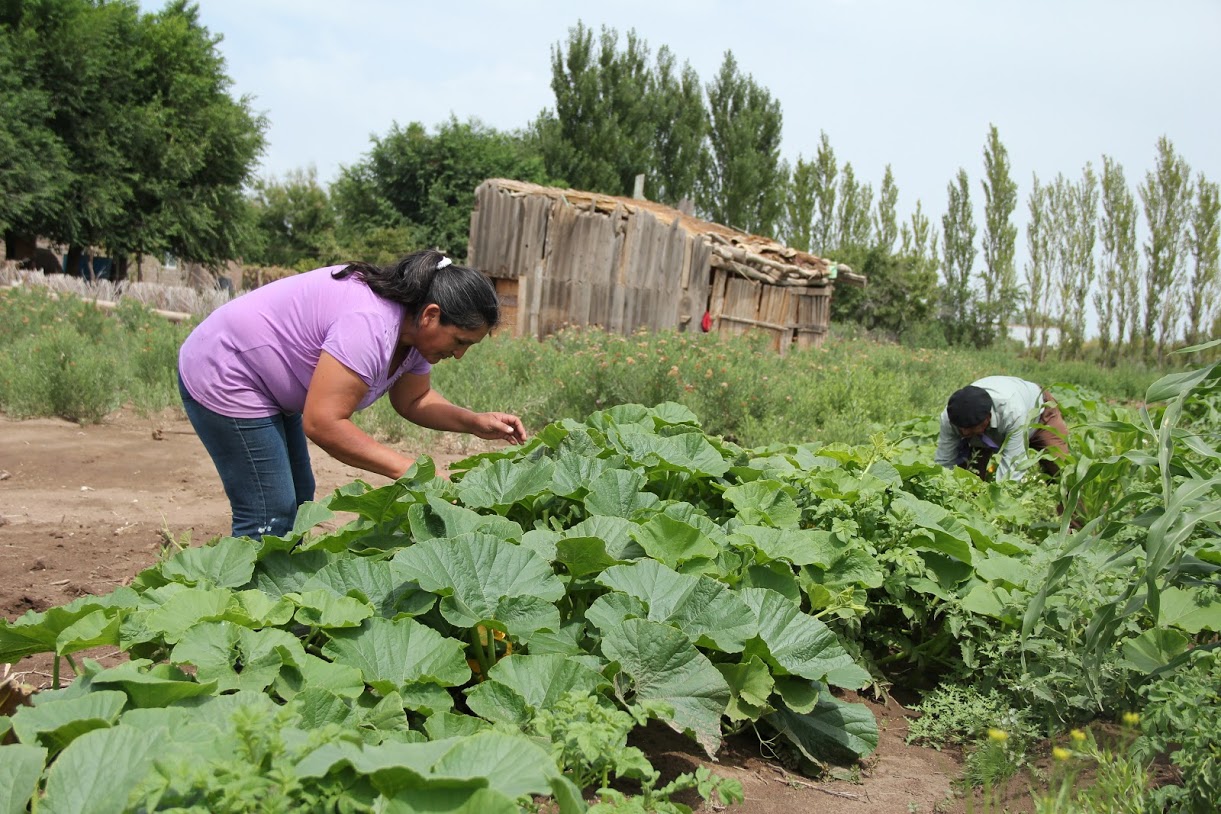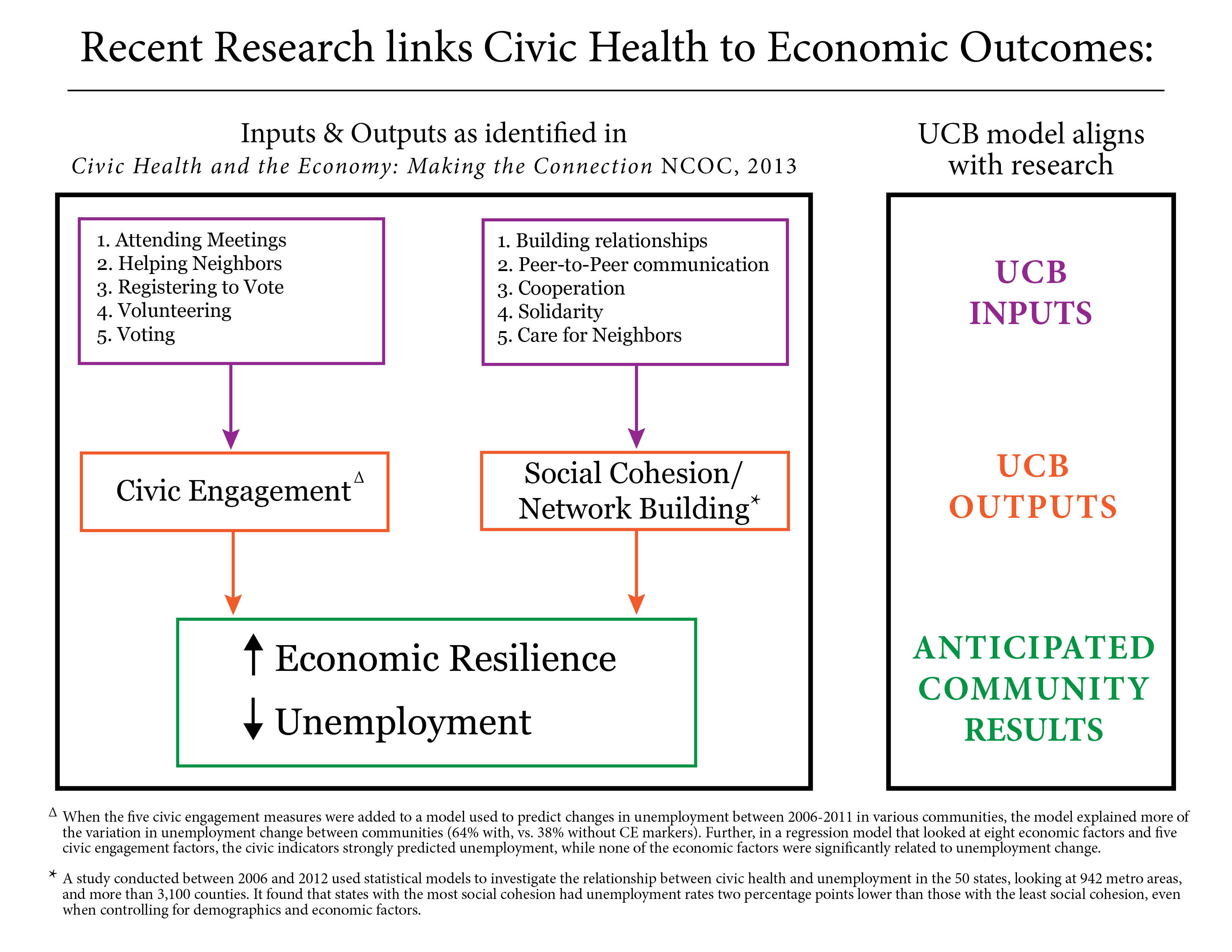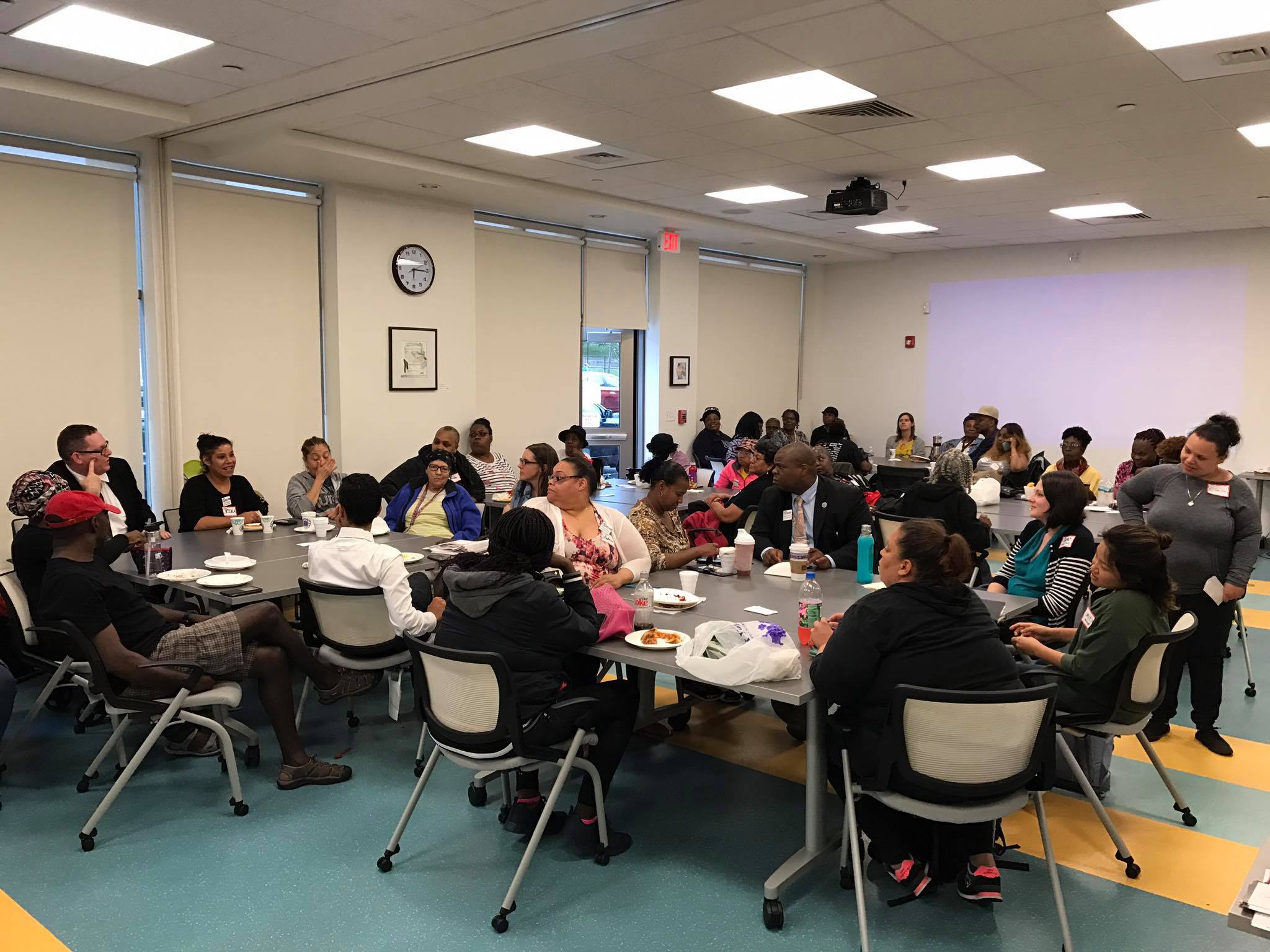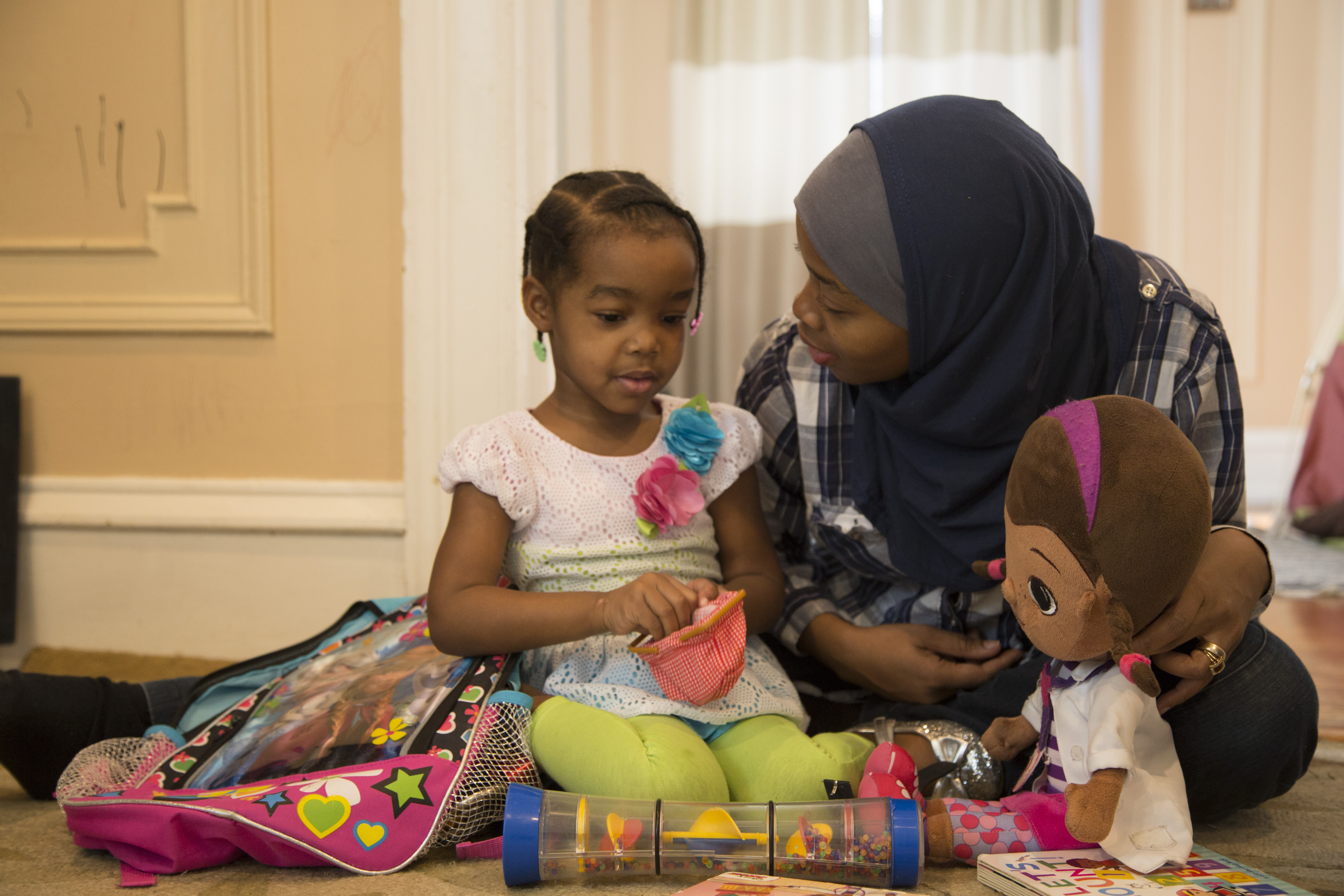Executive Summary
As a long-standing parenting education organization, Families First is always looking to innovate in order to address challenges and improve its service delivery. Thus, it recently transformed its program model to provide three times more hours of support for each participating parent. While necessary to accomplish the intended outcomes of stronger parent-child relationships and increased parental access to social supports, this shift to longer-term programming requires a greater commitment from parents facing poverty and related stressors. In turn, this creates additional pressures on parent recruitment and retention strategies.
In collaboration with Social Venture Partners Boston’s expert consultants, Families First’s staff has addressed the undeniable challenge of retention head-on by incorporating the unique voices and leadership of parent participants. The comprehensive five-tiered strategy described in this article is already showing promising recruitment and retention results as we assess parental needs and experiences throughout the program.
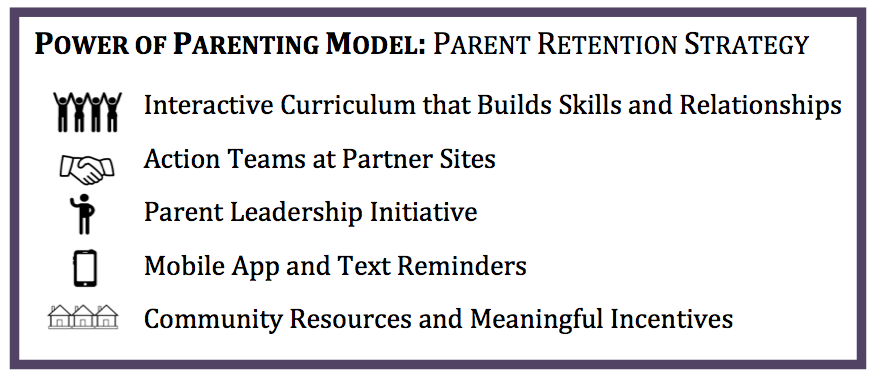
The Value of Comprehensive Programming and the Issue of Retention
Research is clear about the positive effects of parenting education on the success of children facing adversity. Parents who have adequate knowledge, skills, and support networks are uniquely positioned to encourage their young children’s cognitive and social-emotional development, resulting in greater physical and mental health throughout each child’s lifespan.
However, there are many factors that determine whether a parenting education program is capable of achieving strong long-term outcomes. Best practices in the fields of early childhood development and family engagement have shown that the most successful programs:
- Help parents transform knowledge into new skills
- View parents as partners in the work
- Encourage peer support between parents
- Help parents achieve their personal and family goals
- Collaborate to provide interagency care (Caspe, Margaret & Lopez, 2006)
In order to execute these elements, it is imperative that parents are engaged in a parenting program for a substantial number of hours (ideally more than eight) over several months. Yet in today’s busy world, commitment to longer programs presents additional retention challenges.
Quality parenting education programs cannot be successful unless parents are recruited to participate and then retained. But when parents are experiencing multiple adversities, they are less likely to begin and stay with a program, for myriad reasons. Meaningful and effective strategies are needed to combat these issues.
The difficulty of retaining participants is not unique to parenting education programs; rather, it is a universal challenge faced by community-based human service organizations in cities and towns around the world.
An Innovative Retention Strategy within the Power of Parenting Program
At Families First, we have taken cutting-edge research and best practices in the field -- combined with our organizational knowledge and data from almost 30 years of experience in running parenting education programs in the Greater Boston area -- to create an innovative program model that is directly tackling the challenge of retention.
We hope that the strategies described here will guide other organizations to engage more deeply and successfully with the individuals they serve, leading to better outcomes and efficiencies across the sector.
Families First’s retention strategy has been deeply embedded in our new comprehensive, research-based Power of Parenting program model. This program gives parents the knowledge, skills, and support networks they need in order to build healthy, nurturing relationships with their children during the important early childhood years (birth to age eight).
Power of Parenting offers more than 20 total hours of parenting education and support over the course of 16 weeks. This represents a sea change for the organization, as our former model varied widely but offered an average of eight hours over five weeks.
After running pilots of this program, Families First’s evaluation team shared two key findings: (1) parents who completed the program experienced strong outcomes in the areas of parenting knowledge and skills, resilience, and social connections, and (2) only 27 percent of parents completed two-thirds or more of the program sessions.
With these findings in mind, we decided to devote significant resources to cracking the code on parent retention within a longer-term model. Our renewed goal was to ensure that parents gained knowledge and skills from the program while also building a lasting network of parenting support. In addition to revisiting reports and research on successful retention strategies, we held focus groups and interviews with parents to hear from them directly about what was keeping them from attending the program.
Furthermore, we have worked with a variety of partners -- schools, childcare centers, health centers, and other family-serving organizations -- for decades. While some of these organizations have been very successful with family engagement, others have not. Now we have incorporated learnings from successful partner organizations, as well as the experiences of partners who found family engagement to be a major challenge. These voices were absolutely vital in shaping the future of the program.
The improved Power of Parenting model launched recently, in the early fall of 2017. It includes the following five components that have already shown increased -- and more meaningful -- parent engagement results, and, as a result, improved retention in the program. The quotes under each section represent the voices of parents whose feedback influenced this retention strategy.
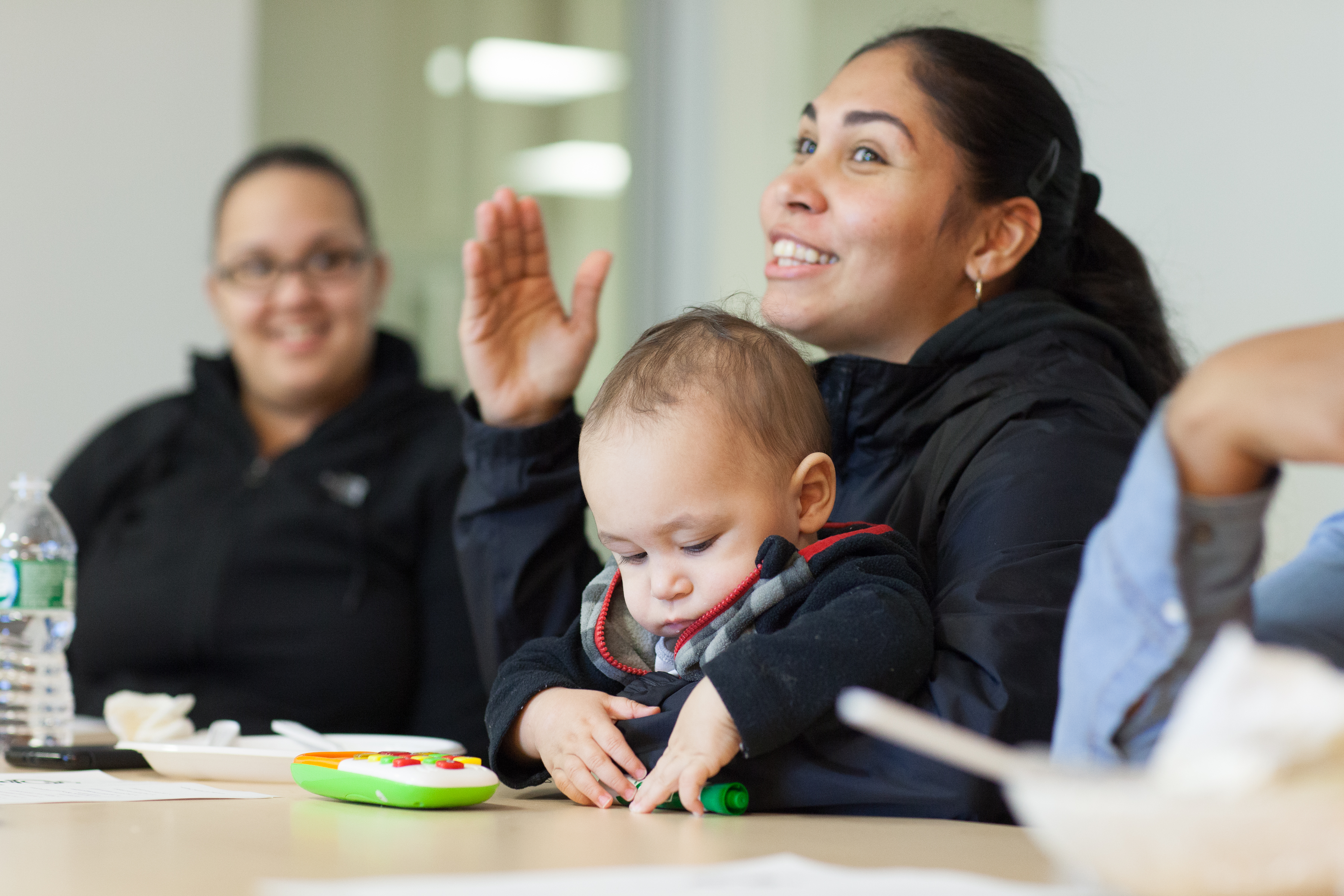
Parents at Urban Edge in Roxbury, MA during a pilot of the Power of Parenting program
Photo credit: Kara Delahunt
1. Interactive Curriculum that Builds Skills and Relationships
“I came for the information, but I got to know and really like the Parenting Educator and the whole group.”
Power of Parenting includes seven interactive, research-based parenting workshops that guide parents to build their knowledge of parenting and child development. The curriculum has been revamped to provide more concrete strategies, solutions, and skill-building activities, which make this knowledge actionable.
Parents are encouraged to try specific strategies at home and return the following week to share their experiences. This removes the ambiguity of some parenting education curricula (i.e., “how do I actually apply this knowledge with my child?”), and we have found that parents are more excited to return when they are given opportunities to report back to the group.
To round out this aspect of the strategy, three discussion-based Parent Café sessions (developed by Strengthening Families™) are offered in the place of workshops every few weeks. These sessions provide a full 90 minutes for parents to work in small groups and take the lead, share their challenges and successes, and build social connections. After implementing these sessions, more parents reported being excited to come back and see each other -- and we have found these social relationships to be a major force for retention.
Each program is facilitated by a Families First Parenting Educator, all of whom have expertise in fields such as psychology, social work, and education, as well as deep roots in the communities we serve. In order to help parents build relationships with each other, Parenting Educators use their advanced facilitation skills to create a comfortable environment and engage parents who may be reticent to participate at first. Moreover, because of the increased number of program hours, parents are able to build strong relationships with their Parenting Educator. This keeps them coming back, and some parents even stay in touch with Parenting Educators long after the program ends.
With these elements in place, the program sessions are interesting, engaging, and enjoyable for parents, all of which creates a strong foundation for retention.
2. Action Teams at Partner Sites
“I was excited to join the team and bring parenting education to my community because I know how powerful parenting is.”
When service providers unite around common issues, programming becomes more effective and efficient, and the outcomes achieved are more sustainable (Drummond, 2007). Families First works in partnership with other family-serving organizations to bring the Power of Parenting to parents where they are already receiving other services. Partners include community development corporations, early education providers, and other social service networks. This format removes barriers to attendance for many parents, such as transportation or unfamiliarity with an agency.
Before the Power of Parenting program begins at a partner site, an Action Team is created to develop, monitor, and execute a recruitment and retention plan. The participation of Parent Leaders on this team (see #3) is strongly encouraged to maximize outreach efforts. The team plans engagement activities and tasks in accordance with program goals and the partner organization’s capacity, and Families First provides materials for outreach to potential participants. Retention activities executed by this dedicated team include follow-up calls, emails, and text messages targeted to parents who have been absent from the program.
3. Parent Leadership Training
“It’s not just for my children; it’s for all the children.”
Due to the program’s unique and collaborative group dynamic, certain parents have graduated with a strong drive to help other parents in their communities, and we have seen leaders emerge naturally. This pattern inspired a new Parent Leadership Initiative, which is launching this year. Through this initiative, parents receive leadership guidance and professional development, as well as a monetary stipend for connecting parents in their community to the program, reminding peers of upcoming sessions, and assisting program staff during the sessions.
Furthermore, their voices are elevated in this role. They can join Families First’s new Advisory Council and/or serve as Parent Ambassadors by speaking at community-wide events to engage other parents. They also provide key feedback and support to make each program stronger.
4. Mobile App and Text Reminders
“I like how I can communicate with the educator and the other moms… we can have a group chat about our kids.”
Last year, Families First began experimenting with the use of a mobile app, where parents could find information and videos related to each session. We recently incorporated a new “Forum” tool, through which Parenting Educators and parents can engage in further discussions about each week’s content. Corresponding to the interactive curriculum, the app reminds parents to try new strategies during the week and allows them to ask questions as challenges arise. Their personal experiences are valued and their voices are heard as they share tips and respond to their peers’ parenting concerns. In turn, the Parenting Educator receives real-life data to inform how parents in his or her program are progressing.
Each forum is restricted to the parents in a certain program, which promotes trust and creates a safe environment that is not often found among other online tools. Safety and privacy promote trust and deepen relationships. And when parents communicate throughout the week, they are more likely to come back to the next in-person session. Lastly, we have begun to send text message reminders. Parents’ feedback shows that the texts are effective in helping them remember to attend sessions.
5. Community Resources and Meaningful Incentives
“I didn’t finish high school, so it was hard to find a good paying job. But my son was my motivation.”
When parents are facing a multitude of adversities, their receptivity to parenting education programs may be overwhelmed by other needs. The presence of, or referral to, stable and supportive services can help. In many ways, the partnership-based model fulfils this need. Partner organizations may provide housing services, employment or financial training, early care and literacy programming for children, or access to nutrition and health services. With comprehensive support for the whole family, parents are more likely to have the capacity to commit to a longer-term parenting education program.
To supplement these services, we have reworked our own program’s incentive structure. Our new Partner Relationship Manager is focused on listening to parents and understanding their personal and family goals in order to shape the incentives that we provide for graduating parents.
New incentives for program graduates include up to three experiential course credits at Urban College of Boston, graduation attire from Dress for Success, college and career guidance from Match Beyond, and family memberships to local museums. As opposed to monetary incentives, which are commonly used in the field, parents have told us that the new incentives we offer are more valuable because they are longer-lasting -- they help parents pursue personal and professional goals or experience new things that their children will remember for a lifetime.
Proven retention strategies such as offering childcare and meals have always been part of our programming. Recently, we have built upon our partnership-based approach to offer two-generational programming at select sites. For the past three years, Jumpstart has provided early literacy programming for children while their parents participated in our programming at Urban Edge housing developments in the under-resourced communities of Roxbury and Jamaica Plain. Parents reported that this was a major motivation to keep coming back, as they knew the time was beneficial for their children -- and their children were excited about attending each week.
Indicators of Progress
In order to ensure successful retention, Families First begins with choosing the right partners for our program. Our team created a Site Assessment Rubric to determine a partner's readiness and fit for the program, including their current level of family involvement and communication with families as well as existing resources and capacity for family services. The rubric results, along with Action Team meetings, help Families First better support selected partners to recruit and retain parents in the program. A post-recruitment survey is also given to partner staff in order to ensure their satisfaction and improve Families First’s recruitment processes.
From parent participants, Families First consistently monitors weekly attendance to analyze trends and identify when individual parent follow-up is needed. At the end of each program, parents are given a survey that is closely tied to the widely-accepted Protective Factors framework, developed by the Center for the Study of Social Policy.
The survey includes a combination of questions based on the Nurturance subscale of the Child-Rearing Practices Report, a validated measure, as well as additional questions related to parental resilience and social connections. The majority of the questions ask parents to rate how true each statement was for them before and after the program. For example, one statement reads “I express my affection by hugging, kissing, and holding my child,” while another reads “I use other parents for parenting ideas and strategies.” Positive change in these areas strengthens each parent’s relationship with their children and their community, which ultimately increases their ability to support their family’s long-term success.
Parents are also asked about their satisfaction with the program, which provides insight into the aspects that motivate them to keep coming back. For programs that are currently running, as of week four, 88 percent of parents who came to the first week have returned compared to 57 percent during the same week in last year’s programs.
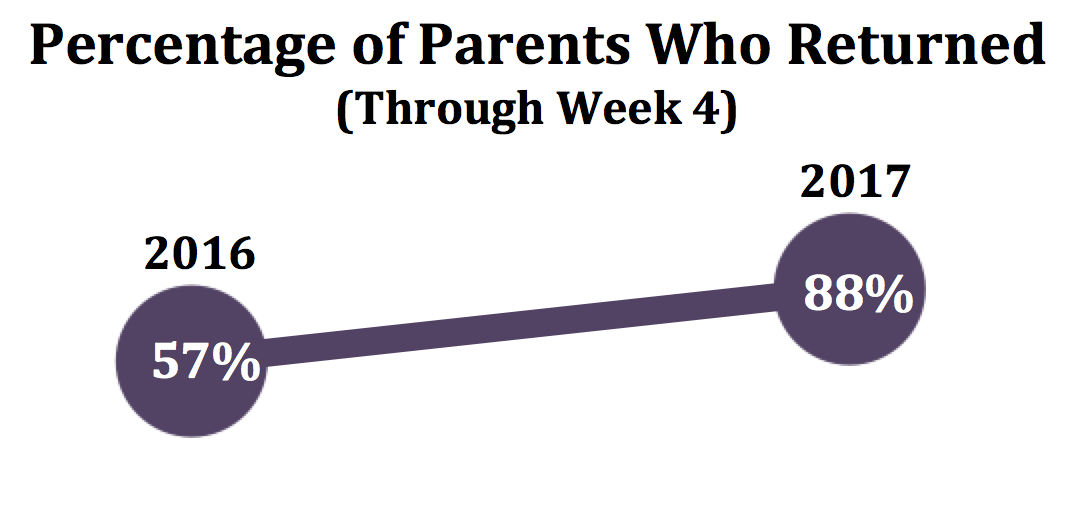
A Unique Approach
Families First’s partnership-based approach puts us in a strong position to eliminate barriers to attendance for parents. When parents have to travel to a distinct location to receive parenting education -- versus their local school or community center -- transportation can be a challenge. Furthermore, accessing parenting education from a separate provider while receiving other supportive services elsewhere can be overwhelming. A streamlined partnership-based approach enables parents to participate in our program where they are already congregating to receive other services -- or even right where they live.
We have also seen the unique benefits of training and supporting a corps of expert Parenting Educators to carry out our programs, as opposed to utilizing a train-the-trainer model. 100 percent of partner organizations gave our Parenting Educators the highest possible rating, and parents’ positive feedback often centers on their relationship with the Parenting Educator. As mentioned above, these relationships keep parents coming back each week, which is key to retaining parents for the duration of our programming.
As the organization invested a great deal of time and resources to develop the Power of Parenting curriculum, our Parenting Educators are offered regular trainings and ongoing support from our staff in order to ensure fidelity to this curriculum. This level of consistent program quality is attainable because of a model that supports the training and growth of this select group of educators.
We consider our Parent Leaders and Ambassadors to be important advocates for our programs and we utilize their voices in other agency endeavors, such as our annual fundraiser. Families First also recognizes the need for a balance between engaging and supporting Parent Leaders -- enabling them to “own” the work and develop as parents within their community -- while also relying on the expertise of our trained educators.
Even when parents’ official role is complete and the programs are over, Parenting Educators have been known to be invited and attend graduates’ personal milestone events such as GED ceremonies. This relationship makes us unique because it moves the organization beyond traditional recruitment and retention efforts and is a confirmation of our longer-term impact.
Sustainability through Diverse Funding
Traditional revenue streams, including private and corporate foundations and individual donors, are fueling the Power of Parenting program. We have heard from several Boston-based funders that improved attendance and retention will strengthen our case for support, and we anticipate increased funding as our evaluation data begin to show more progress in this area.
Meanwhile, the organization is moving in a direction that will diversify our revenue mix by increasing earned revenue. Partner organizations have always paid modest fees that help to secure their commitment to the work while offsetting some costs. The Power of Parenting program, with its value-added components of partner and parent leadership support, is appealing to a new tier of community partners.
New partnerships with larger service providers will offer an avenue for both reduced costs and increased revenue. For example, by working with one organization that has five program sites, we will create efficiencies in our use of staff time for partnership-building and maintenance. It is also more likely that the recruitment and retention strategies that worked at one site will work at another site within each agency’s network. Parent Leaders and Ambassadors from Child Care Center A can provide support and guidance for Child Care Center B’s launch, as well. Furthermore, we anticipate that adding a comprehensive parenting education program across all sites will increase a partner agency’s competitive advantage for their own funding.
A Strategic Growth Plan Ensures Continued Success
The success of the Power of Parenting’s recruitment and retention strategy is, in many ways, driven by the Action Teams, composed of parent, partner, and staff representatives. In particular, the new role of Partner Relationship Manager is key to scaling the program, so growing the capacity of this position within our organization is an important next step.
Scaling is also most successful when there is a clear set of standards identifying the “readiness” of the partner to launch the program in their community. Our Site Assessment Rubric has proven invaluable in this regard. It has helped us identify community partners with the appropriate resources (i.e., high capacity for parent engagement) as well as the potential to grow efficiently. Scaling within this type of partnership model also lends itself to accumulating consistent data as we continue to evaluate our impact in the community.
With robust resources, appropriate staffing, and an efficient partnership model, Families First is able to successfully improve parent recruitment and retention to maximize the impact of the interactive, research-based Power of Parenting program and increase positive outcomes for families.
Families First’s trajectory follows the recommendations of researchers and leaders in the field as well as the voices of our own clients and partners who have an acute knowledge of Boston’s unique challenges and opportunities. As such, our team hopes that the successes we have realized in the area of parent retention will inform other agencies, practitioners, and policymakers who are seeking out the strongest methods for ensuring the health, well-being, and resilience of our local families and neighborhoods.
Works Cited
Caspe, Margaret, and Elena M. Lopez. "Lessons from Family-Strengthening Interventions: Learning from Evidence-Based Practice." Harvard Family Research Project (2006).
Drummond, Jane. “Parent Support Programs and Early Childhood Development: Comments on Goodson, and Trivette and Dunst.” Parenting Skills (2007).
National Academies of Sciences, Engineering, and Medicine. Parenting Matters: Supporting Parents of Children Ages 0-8. (Washington, DC: National Academies Press, 2016).
Author Bios
Susan Covitz MSW
Sue is Families First’s Executive Director. She has held leadership positions with the organization for more than a decade, serving as the Director of Strategic Partnerships, Director of Outreach and Education, and Deputy Director. Prior to joining Families First, Sue served as the Executive Director of Greater Options for Adolescent Lives and has more than 20 years of experience in non-profit management, coalition building, and community organizing. She received a Bachelor of Arts in Philosophy from Haverford College and a Master of Social Work from Boston College. Sue is the parent of two college-age daughters and participated as a parent in Families First workshops when her children were toddlers.
Jill Brevik MS
Jill is the Associate Director of External Relations at Families First, and she has been with the organization since 2014. Prior to this, she was part of the financial development team at the American Red Cross of Massachusetts. Jill began her career in nonprofit management after graduating with a Bachelor of Arts in English from the University of Vermont and traveling to Southeast Asia where she volunteered with several education-based organizations. Upon returning, she joined Boston’s nonprofit community to use writing and storytelling to help local populations in need. Jill also received a Master of Science in Nonprofit Management from Northeastern University, and she is the proud mother of a two-year-old son.





